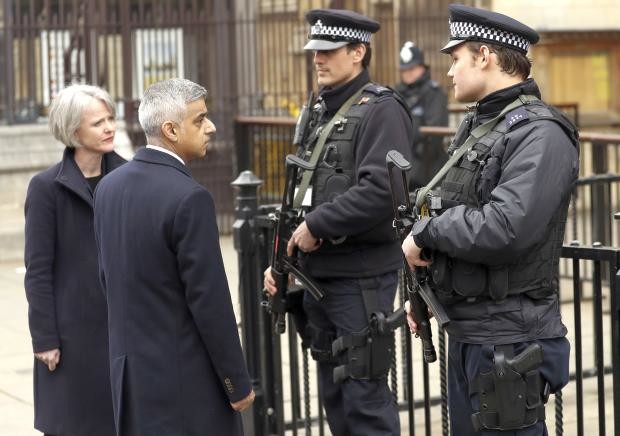
London Mayor Sadiq Khan talks with a police officer outside the Houses of Parliament in London, Friday March 24, 2017. On Thursday authorities identified a 52-year-old Briton as the man who mowed down pedestrians and stabbed a policeman to death outside Parliament in London, saying he had a long criminal record and once was investigated for extremism – but was not currently on a terrorism watch list. (Photo by MATT DUNHAM / AP)
LONDON — Police are combing through “massive amounts of computer data” and have contacted thousands of witnesses as they look for clues about why a British-born man became radicalized and launched a deadly attack on Parliament, a senior police official said Friday.
As the fast-moving investigation led to more arrests and searches, police revealed that the attacker, Khalid Masood, was born Adrian Russell Ajao in southern England in 1964.
In a briefing outside Scotland Yard, London’s top counterterror officer, Mark Rowley, said two more “significant” arrests had been made, bringing to nine the number of people in custody over Wednesday’s attack.
Detectives have searched 21 properties in London, the central English city of Birmingham and Wales.
“We’ve seized 2,700 items from these searches, including massive amounts of computer data for us to work through,” Rowley said, adding that contact had been made with 3,500 witnesses.
“We’ve received hundreds of uploads of video images to our online platform. Given this attack was in the heart of the capital we also, of course, are dealing with statements from a wide range of nationalities.”
Masood drove his car into crowds of people on Westminster Bridge on Wednesday afternoon before fatally stabbing a police officer at the Houses of Parliament. He was shot dead by police.
An American man from Utah, a British man and British woman were killed on the bridge, and police officer Keith Palmer died at Parliament, police said.
The latest victim, who died in a hospital on Thursday, was identified as 75-year-old Leslie Rhodes from south London.
More than 50 people of a dozen nationalities were injured, 31 of whom required hospital treatment.
“Those affected include a real cross-section of ages from at least 12 nationalities,” Rowley said. “It’s a poignant reminder, I think, that the impact of this attack on the capital will reach around the world. ”
Rowley said two police officers targeted in the attack have significant injuries. Two other people also remain in critical condition, one with life-threatening injuries.
The 52-year-old attacker was born in southeastern England and had most recently been living in Birmingham, where several properties have been searched by police.
Police say Masood has used several aliases and had a string of convictions between 1983 and 2003 for offenses including assault and possession of an offensive weapon.
Prime Minister Theresa May said Thursday that Masood was “investigated in relation to concerns about violent extremism” some years ago. But she called him “a peripheral figure.”
The Islamic State group claimed responsibility for Wednesday’s attack. Police believe Masood acted alone, but Rowley said police are investigating whether he “acted totally alone inspired by terrorist propaganda, or if others have encouraged, supported or directed him.”
Nine people remain in custody on suspicion of preparing terrorist acts.
Once his identity became known, police and the media began to trace the movements of the attacker in his final hours.
The manager of a hotel in the beachside city of Brighton where Masood attacker stayed the night before the incident said he seemed unusually outgoing and mentioned details about his family, including having a sick father.
“He was normal, in fact friendly, because we spent possibly five or 10 minutes talking to him about his background and where he came from,” Sabeur Toumi told Sky News on Friday.
Police raided the room at the Preston Park Hotel in Brighton after the attack, searching for clues about Masood. Among the items seized were the trouser press and the toilet paper holder.
Further details of the aftermath of the rampage continued to emerge.
A former British army officer told the BBC on Friday that rescuers held the hand of Constable Keith Palmer and talked to him as they tried in vain to save his life after he was stabbed during the attack on Parliament.
Mike Crofts, a former army captain who served in Afghanistan, said he was in the courtyard outside the Houses of Parliament following a meeting with politicians about using boxing to engage young men when the attack took place.
“I rushed towards the scene,” he said, and began first aid with another person in civilian clothes, who turned out to be Staff Sgt. Tony Davis, one of Crofts’ instructors at Sandhurst, Britain’s military academy. Ultimately, there were 20 to 30 people working to save the officer’s life.
“Unfortunately, despite our best efforts, we were unable to save him,” Crofts said. “(Police Constable) Palmer at the time was surrounded by a whole host of colleagues who really loved him. We held his hand through the experience. We talked to him throughout, but unfortunately he passed away.” –Danica Kirka and Jill Lawless